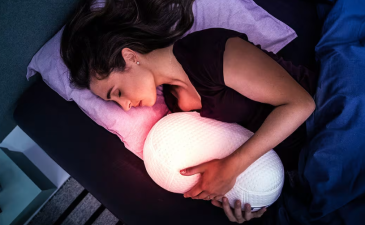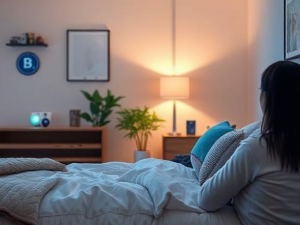With the theme of World Sleep Day 2025 "Healthy Sleep, the First Choice", sleep health has once again become the focus of public attention. In the fast-paced modern life, sleep problems are becoming more and more common, and the rapid development of smart home technology has provided a new solution for improving the sleep environment. Through the linkage and personalized settings of intelligent devices, smart homes are creating a healthier and more comfortable sleeping environment for humans.
With the theme of World Sleep Day 2025 "Healthy Sleep, the First Choice", sleep health has once again become the focus of public attention. In the fast-paced modern life, sleep problems are becoming more and more common, and the rapid development of smart home technology has provided a new solution for improving the sleep environment. Through the linkage and personalized settings of intelligent devices, smart homes are creating a healthier and more comfortable sleeping environment for humans.

Smart Home: The "Guardian" of the Sleep Environment
The core of smart home is to connect home devices through the Internet of Things technology to achieve intelligent matching of environment and needs. In the sleep scene, the smart home system can optimize the sleep environment in the following ways:
- Smart lighting: simulate natural light to adjust the biological clock**
Light is an important factor affecting the human body's biological clock. The smart lighting system can automatically adjust the brightness and color temperature of the light according to the time. For example, it gradually dims the light and switches to warm colors before going to bed to help the human body secrete melatonin and promote sleep. In the morning, it simulates the sunrise light to gently wake up the user to avoid the discomfort caused by the sudden alarm sound.
- Smart temperature control: creating a comfortable sleeping temperature**
Research shows that a suitable room temperature (usually 18-22 degrees Celsius) helps improve sleep quality. The smart temperature control system can automatically adjust the air conditioner or heater according to the user's sleeping habits and real-time ambient temperature to ensure a constant temperature and comfort in the sleeping environment. In addition, smart mattresses or sheets can also be dynamically adjusted according to the user's body temperature changes to further enhance the sleep experience.
- Smart speakers: creating a sleep-aiding atmosphere**
Noise is one of the main factors that interfere with sleep. Smart speaker systems can help users relax by playing white noise, natural sound effects or sleep-aiding music. At the same time, smart noise reduction technology can block external noise and create a quiet environment for sleep.
- Smart monitoring: real-time analysis of sleep quality**
Smart bracelets, smart pillows and other devices can monitor the user's sleep status in real time, including heart rate, breathing rate, number of turns and other data, and generate sleep reports through AI algorithms. Users can adjust their work and rest habits based on the report, and the smart home system can also automatically optimize the sleep environment based on the data.

Personalized service: the unique advantage of smart homes
Another advantage of smart homes is their personalized service capabilities. By learning users' sleeping habits and preferences through AI, smart home systems can customize exclusive sleep plans for each family member. For example, for insomniacs, the system can recommend suitable sleep-aiding music or adjust the room lighting; for snoring problems, smart pillows can automatically adjust the height to improve breathing conditions.
Conclusion
Sleep health is an important guarantee for quality of life, and smart home technology provides new possibilities for optimizing the sleeping environment. Through technological empowerment, smart homes not only make the sleeping environment more comfortable, but also provide users with personalized health management solutions. In the future, with the further development of technology, smart homes are expected to become an essential partner for everyone's healthy life, helping to achieve the goal of "healthy sleep, the first choice".

